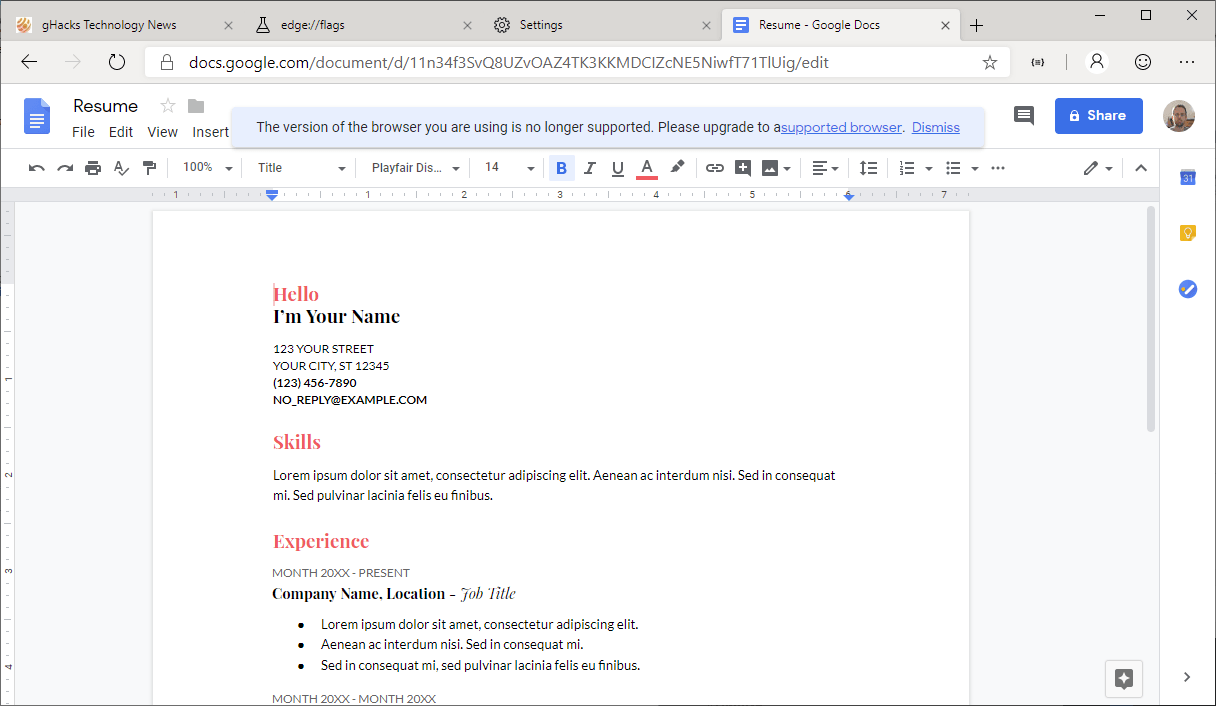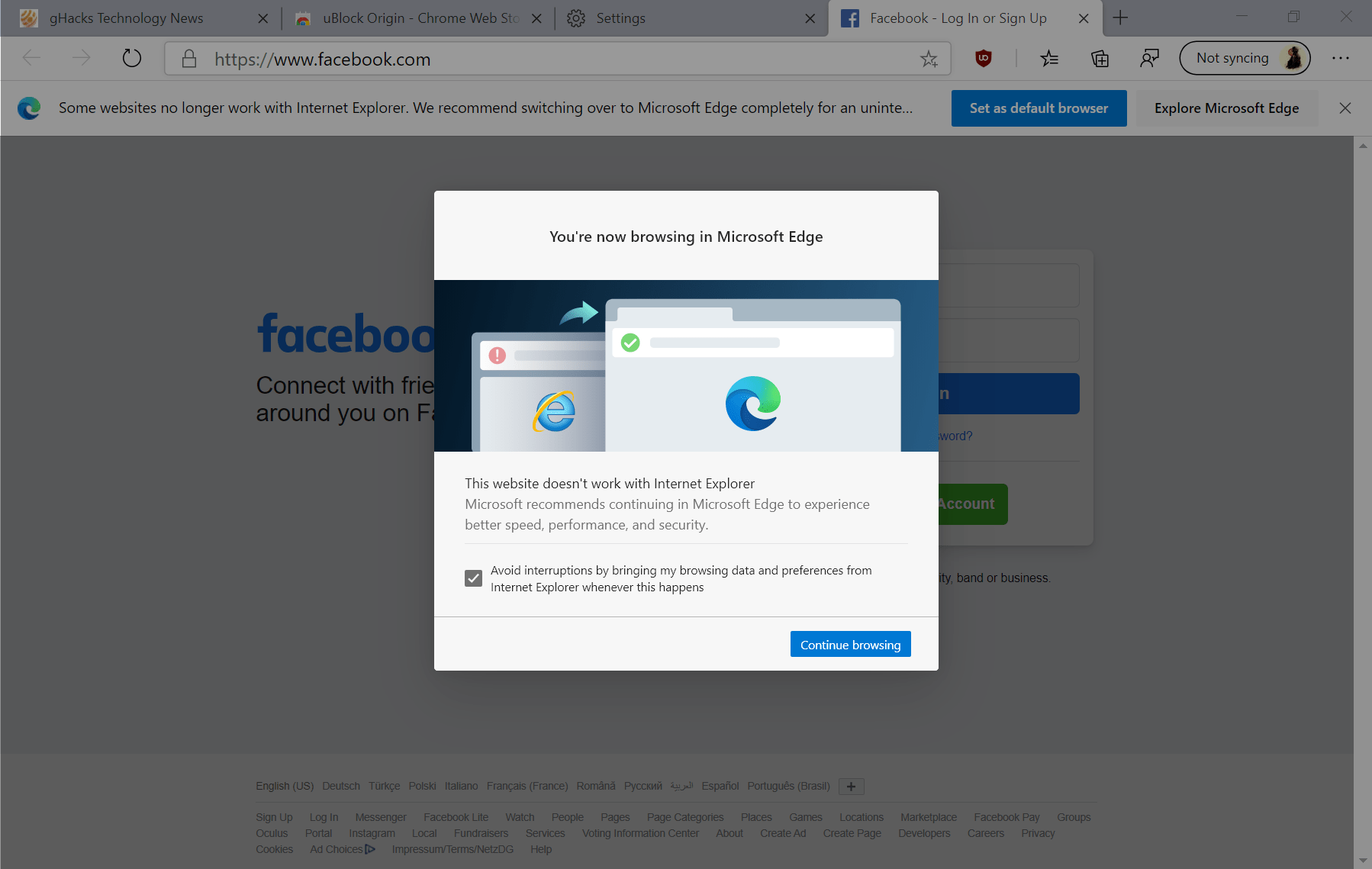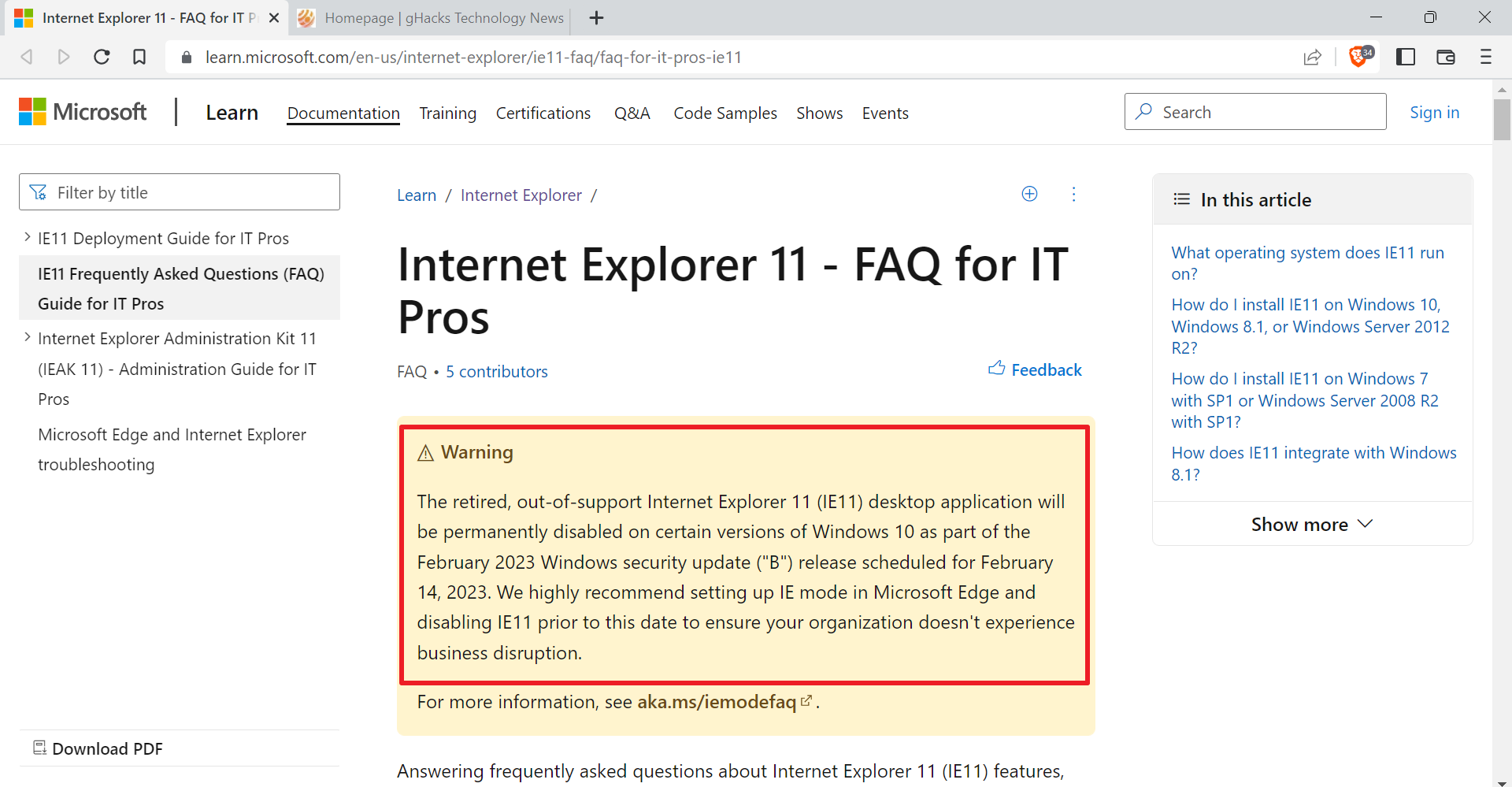Google Docs displays "unsupported browser" for Chromium Edge

Users of the Chromium-based Edge browser that access Google Docs in the browser receive an "unsupported browser" notification when they open any document using the service.
Microsoft is working on a new browser that is based on Chromium; the same core that Google Chrome uses. The browser is available as a development preview at the time but it supports more or less the same feature set as Google Chrome.
Google Docs displays a "The version of the browser you are using is no longer supported. Please upgrade to a supported browser" notification when the service is accessed using Microsoft Edge.
The "supported browser" links opens a help page on the Google website that lists Chrome, Firefox, Safari, Internet Explorer and Microsoft Edge as supported.

Why then the message? It appears that Google implemented user-agent sniffing on Google Docs and that the new Chromium-based Edge browser is not found on that list. If you change the user-agent, the error goes away automatically.
Microsoft implemented automatic user-agent switching in the Edge browser, but it does not help in this case because there is no exception for Google Docs implemented currently.
The same mistake happened a couple of days ago with Google Meet, another Google service that suddenly stopped working for Microsoft Edge users.
Google released a statement after the incident became known that the issue was caused by Edge using a new user-agent string, and that the new string was not on the whitelist that the service uses. Google would add Edge's user-agent to the whitelist to make sure that Edge users could use the service properly.
Could it be that the Google Docs incident is just another missing user-agent error?
Even if it is, the number of incidents like this is striking. Microsoft is not the only company that is on the receiving end; Mozilla had to battle with Google time and time again to make sure that Google services would support Firefox properly.
Google displayed notifications to Firefox users regularly asking them to switch to a supported browser. Former Mozilla executive Johnathan Nightingale accused Google of outfoxing Mozilla by torpedoing Firefox again and again.
Mistakes happen, but when you see a sustained pattern of “oops†& delay from this organization - you’re being outfoxed.
It looks as if history could repeat itself, this time with the new Microsoft Edge on the receiving end. Microsoft Edge does some things better than Chrome already, and it could become a force to reckon with once it leaves beta.
Is it possible that a company like Google is making these kinds of mistakes over and over again?
One could argue that support for other browsers is not very high on the company's agenda, especially since Google Chrome is reigning supreme on the desktop and on mobile (except on iOS and Macs).
Now You: What is your take on this? Deliberate intervention, indifference, or just a series of honest mistakes?

















I am not feeling sorry for Microsoft. Google is giving them a piece of their own medicine. Microsoft is using all the time their Windows dominance to promote other Microsoft products against competitive products. Google is using the dominance of their services to promote Chrome against competitive products. Karma is a bitch.
Deliberate malice, I would think. Google seems to be out of control.
Google blocking competition is not very nice. But Microsoft has done, and is continuing to do a lot of things to the public that aren’t very nice either: (GWX, bloatware, and ads in Windows 10). So I’m not exactly crying for them. If they had a clean slate of good behavior, I would probably feel differently.
I would guess Google is at least somewhat concerned about Edge success as a chromium browser without all that Google stuff baked in. So much so, they may be showing their options in how they intend to persuade users to stick with Chrome. Nothing new for Google who has done similar stuff to Opera and other Chrome clones. Firefox too, also has felt the wrath of Google trying to prevent users exodus from Chrome. Time will tell how much of a thorn Microsoft Edge becomes for Google.
The real irony here is of course Google using a whitelist (!) of user-agents for access to their services. There was a time when engineers discovered something didn’t work in a specific browser, that they offered a warning to those users. (and it was commonly accepted that if you use a browser with <1% market share, then you knew the potential problems)
Google just turned things upside down and only put the 5 major browsers on the whitelist. That way you have absolute control of your user base and make sure no competitive browser will emerge.
You can, of course, always argue why a whitelist is a sensible decision in the modern browser landscape, but Google is obviously always chosing the easiest path to their own success. So that shouldn't surprise anybody. What is more surprising is how everyone seems to be ok with Google doing that.
Although they will not have it that easy with Edge, those people qill quickly counteract the Google measures. Just like Opera did it, just use the Chrome user agent when in doubt.
That's the problem with Firefox: It doesn't want to acknowledge that google won, and can dictate everything. The Edge devs highest priority will be to achieve usability for the users, no matter what that means for the user-agent.
Mozilla has recently integrated a about:compat site. wich right now contains the following list of user agent overrides and fixes: https://i.imgur.com/bzSQD8P.png
Note that youtube, twitch, bankofamerica and directvnow have hundreds of millions of users, and it shows how much of a patchwork rug firefox has become. for every big site there are ten smaller sites that already stopped working.
Unfortunately Mozilla in reality is just an employee of Google. In a free market, if a corporation has only a single customer for years, the customer usually buys up the corporation, because that is cheaper overall. Of course, we know why this didn't happen with Mozilla and Google – antitrust issues.
Conspiracy theory: What happened instead was that Google and Mozilla execs sat together in the end of 2013, and thought about ways to ensure that Mozilla stays alive long enough, because it had already dropped to less than 15%, from a top of 30% in 2011. While IE and FF were going down, Chrome was only going up. So with the help of Ex-Google Marissa Mayer, they cannibalized Yahoo in favor of Mozilla and stuck a search-engine deal that was so insanely bad for Yahoo, that Yahoo is still fighting it in court, and probably succesfully. (https://gizmodo.com/yahoo-s-insanely-bad-deal-to-pay-mozilla-375-million-a-1821043679)
As a result, Mozilla had to go back to Google, because Yahoo was fighting back the hostile takeover by Mayer.
So that is why "Google outfoxing Mozilla" is a natural consequence, because Google the company thinks it owns Mozilla. As long as Mozilla is financialloy dependent on Google it will bend over, and Mozilla engineers will be frustrated.
They still have a chance to get away from the toxic relationship and go to DuckDuckGo as their partner: Their revenue would probably drop by around 70%, but they would start becoming credible in the eyes of the users again, could ask for more donations, and really ship privacy-friendly software. With 10% of the desktop traffic it would also make DuckDuckGo grow in an unpreceted rate, and will help make the search results way better.
They could go with such a risky move because they have enough money in the bank to run without any revenue for more than a year. Switch to DuckDuckGo, Startpage and Qwant – start to work with Brave on BAT. Work together with Microsoft, Brave, Opera or Apple on a modern browser engine that doesn't require much work.
Over time they would have to fire maybe 20% of their engineers and 40% of their marketing people, but it would ensure the long-term survival of Mozilla. Due to the overall growth of the web Mozilla has seen steady growth during the last years, even though their market share fell from a cliff. Just doing at least *something* innovative will already do the trick at keeping them alive.
March with Google instead, and Mozilla will go under with them when the entire ad-business starts to fall down the cliff within 2 years, just like Big Tobacco fell over regulation and public outcry.
There was a recent article on how google sabotaged firefox with lots of ooops we broke that but will fix it (sometime) we promise. Wouldn’t be surprised if this is similar and, if it is, MS only have themselves to blame.
In case of Edge I think it’s most likely that Google did not update their database of supported user agents. In case of moz://a, they probably just don’t care about them – who does these days, really…
Microsoft team using old Chromium repo? Hehe
Well I think at this point, Microsoft lost the browser market forever given how many times they have given up on their browser, resumed development again, but eventually resulting in no good. (IE6 -> IE7-IE11 -> Edge -> Edgium).
They could never implement even the UI customizability and some nice browsing features that IE had (which Chrome never offered) and RSS feeds. All they needed was to fix the shitty speed and rendering engine, instead they abandoned everything good about IE (and Edge too like streaming YouTube videos via DLNA).
All Microsoft does is pull resets on everything they ever built and disappoint users. There’s no end to bloat in sight though even if the features get reset and they begin again from square one.
Microsoft’s browsers were on a LTS schedule since forever, and that term was probably a bit too long for today’s age. IE11 barely got updated according to the newer web standards. Which is sad, because IE11 has really good h/w acceleration and h/w video decoding capabilities – it’s probably still the No.1 browser in this regard on Windows.
I think Google is just testing how users react when they display those messages.